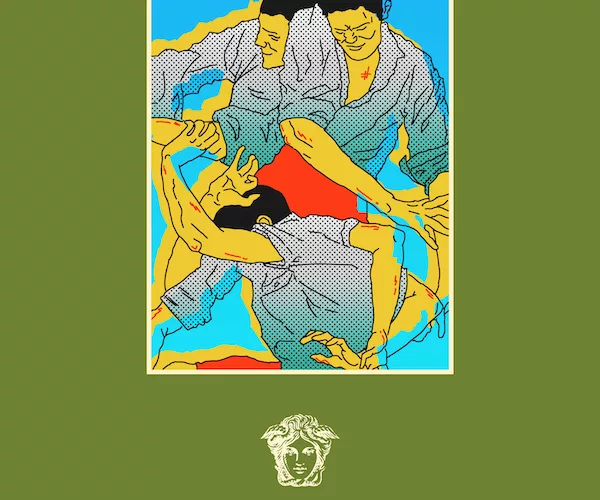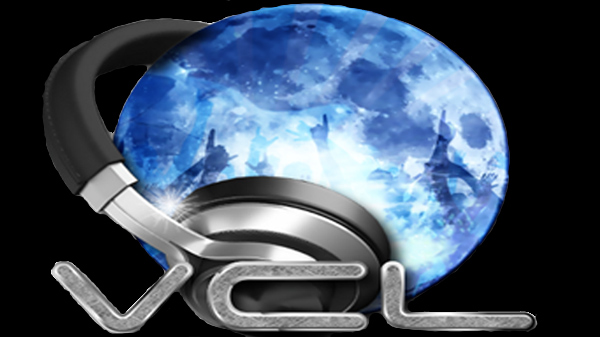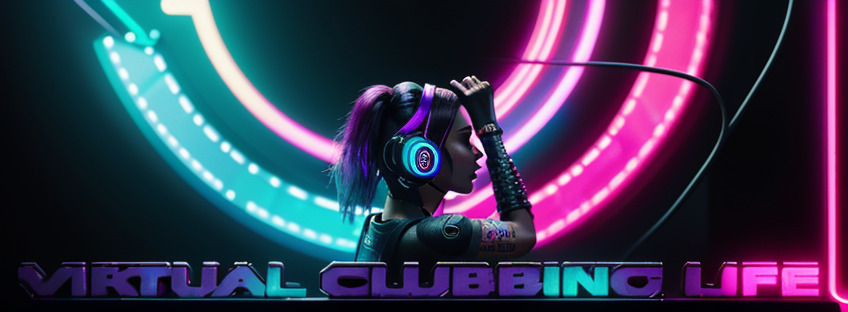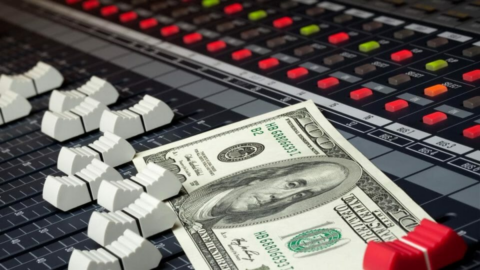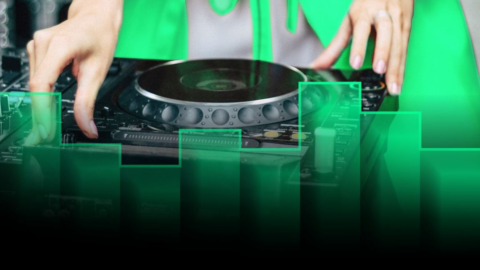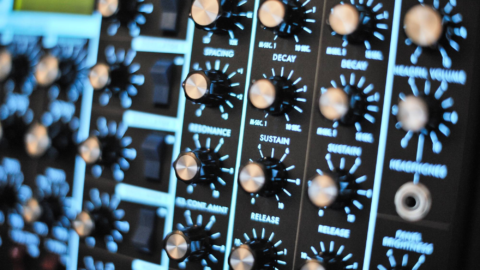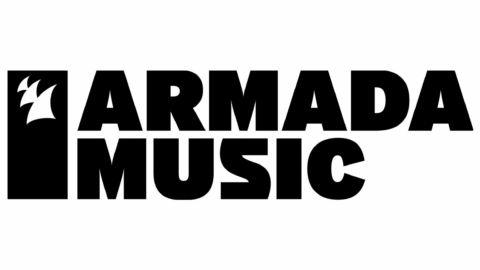The Arts Fuse
Boston's Online Arts Magazine: Dance, Film, Literature, Music, Theater, and more
1 Comment
By Jeremy Ray Jewell
A commentator on Macroblank’s Bandcamp page makes this telling assertion: “AI is Macroblank. Macroblank is AI.”
Vaporwave is an aesthetic that emerged in the early 2010s. It combines multiple visual elements: glitch art, corporate imagery, retro-futurism, neon/pastel colors, and Japanese text (especially the katakana syllabary used to phoneticize foreign words). It is reminiscent of cyberpunk, but it isn’t about creating a fictional world but generating artifacts in our own world that produce a feeling of being displaced. The remembrance of past technologies is key: outlines of Helladic imagery mix with ‘90s Dolby and CDDA logos. Imagined futures — drawn from the past — create a sensation of unease, an artificial nostalgia for what never was. Imagined futures of the past create a sensation of familiar unease and artificial or misplaced nostalgia. Artists in this movement took liberties with the aesthetics of the internet’s early days because they were aesthetics which, like so many AOL CDs, were given to us without our asking, promising us so much and delivering us so little. It may have been vacuous even in its own day, but it is our cultural patrimony.
As a genre of electronic music, vaporwave is characterized by its use of nostalgia-themed samples, lo-fi aesthetics, and ironic commentary on themes of consumerism and technology. It incorporates samples from a wide range of musical sources from the ‘70s to the ‘90s: pop, rock, R&B, jazz, funk, electronic, ambient, and new age. Audio sources may also include TV commercials, movie soundtracks, and other pop culture artifacts. For example, the 2011 track “リサフランク420 / 現代のコンピュー” by Macintosh Plus (a.k.a. Ramona Andra Xavier) samples an upbeat, disco-influenced pop number released by Diana Ross in 1983, “It’s Your Move”. Typical of the vaporwave genre, the 2011 version draws on slowed-down, as well as “chopped and screwed,” samples from the Ross song, a process that has come to be strongly associated with the vaporwave genre.
Surprisingly, the “chopped and screwed” strategy places vaporwave in the same family tree as Dirty South hip-hop of the ‘90s-’00s. Popularized by Houston’s DJ Screw, the technique involves slowing down and manipulating audio samples, often by altering the pitch and tempo. While one of its merits may have been to make the perfect purple drank mix, its broader benefits were twofold: it challenged or avoided claims of copyright infringement while also creating remixes that proclaimed their difference with minimal alteration. Listen to DJ Screw’s mix of Phil Collins’ “In the Air Tonight”: you more or less hear the beginnings of vaporwave. The heavy use of slightly modified mainstream (and often uncleared) samples has its drawbacks. Vaporwave is an underground genre, condemned to live the life of a musical desperado. Forced to live on the fringes, these artists rely on Bandcamp rather than streaming sources with stronger copyright enforcement mechanisms.
So, what is vaporwave? Original art? Parody? Or theft? Or is it morphing into something else? The term that has been coined for this newest iteration is “barber beats“, and its style continues to develop is a much slicker, cleaner direction than vaporware was traditionally known for
ANALOGレアリティ was the last album of 2022 from Macroblank released by Aloe City Wrld, a London-based record label/artist collective. While clearly indebted to vaporwave, Macroblank and other artists (such as Haircuts for Men, which has also produced similar “analog rarities” albums, and who is rumored to be the same person/people as Macroblank) are moving in a direction influenced by newer lofi/chillhop and downtempo genres. The latter styles have gone viral with the rise of YouTuber Lofi Girl’s hours-long livestreams. That channel reached ten million subscribers this year. (In fact, judging by its comment section, the YouTube algorithm has been kind to Macroblank as well.) ANALOGレアリティ samples a variety of songs like those heard on Lofi Girl’s channel. These samples, which originate in the current millennium, include those from many British and European artists: Max Melvin, Lyhre, Kinobe, Blue States, Giyo, Eddie Silverton, Flashbaxx, Living Room, JetTricks. Bangkok’s Fiendsh, Toronto’s Four80East, and Berklee College of Music alumna Aandra (a.k.a. Alexandra Hampton) are also sampled. Some critics argue that Macroblank’s approach is no longer vaporwave. But it would be hard to call it lofi, given artist/s is/are sampling lofi artists using an aesthetic and technique associated with vaporwave. It may be that we are entering vaporwave’s second wave. The genre may be reinventing itself by using contemporary source material, much of which was itself probably inspired by the movement’s earlier productions. Many charge that vaporwave’s original spirit has been lost; others point out that the albums in this new wave sample contemporary artists without giving them credit.
Some critics argue that Macroblank’s approach is no longer vaporwave. But it would be hard to call it lofi, given artist/s is/are sampling lofi artists using an aesthetic and technique associated with vaporwave. It may be that we are entering vaporwave’s second wave. The genre may be reinventing itself by using contemporary source material, much of which was itself probably inspired by the movement’s earlier productions. Many charge that vaporwave’s original spirit has been lost; others point out that the albums in this new wave sample contemporary artists without giving them credit.
To me, Macroblank’s newest release suggests that the essence of vaporwave has not been forgotten.
To begin with, there is the album’s concept, contained in its name: ANALOG レアリティ. The second word is “rarity,” written in katakana. Macroblank has come up with what it calls an experience of “analog rarity”: the album has been released in three variants (labeled A, B, and C), only commercially available for order as CD or tape cassette with each customer’s order being fulfilled by selecting one of the three variants at random. Only 300 copies were made in all, half cassette and half CD. They quickly sold out on Macroblank’s Bandcamp page. There, the artist declared that the music would never see a formal digital release, adding “it is up to you to trade amongst yourselves to complete the collection.”
Maybe this experiment in “analog rarity” is a way of showing us that copyright has never impeded nor facilitated distribution. The full collection – 36 tracks and 3 hours long – was compiled by listeners within two weeks via the VaporPhysicals Discord group and made public via r/Macroblank subreddit and Youtube user tюдор (@fxckabeatup). The concept has its appeal; in the age of NFTs fabricating digital scarcity, the reminder of analog scarcity (albeit artificially fabricated as well) is interesting. Given that before releasing this album in December Macroblank had released at least ten other albums in 2022 (and that one more album has been released since this article was written), one wonders why this one was chosen to illustrate the point… perhaps it was to address the lack of rarity in their frequent digital releases.
Initially, vaporwave occupied its own distinctively alienating category, a sonic uncanny valley. For better or worse, that feeling has atrophied in this album. The music may be labeled lofi, but what we hear doesn’t strongly evoke earlier soundscapes and audio technologies. The sense of unease, present in earlier work by Macroblank, is generally missing in ANALOG レアリティ. The album’s atmosphere is organic and upbeat, a reflection of its contemporary source material. If “chopped and screwed” songs can be produced with automatic ease, then choosing songs that already fall into a closely related genre means we are listening to something more akin to a mixtape from this dimension rather than an artifact from another one.
And yet it is a false nostalgia, once highlighted by vaporwave, that our emerging technologies threaten to inundate us with. With occasional misses echoing in the uncanny valley, our suggestibility for implanted cultural memories is as strong as our willingness to consent to corporate visions of future utopias. That is part of the original message of vaporwave. In this new iteration, however, things are different. That is partially understandable. Unable to pay exorbitant fees to license a popular song, artists were confined to the underground, where they could more easily avoid attention. They cultivated techniques that could alter songs in ways that would make them harder to identify on the part of licensers. In the process, they stumbled upon a new kind of art. They thought they were safe because they were working with the detritus of a previous age.
Now the old fears about “stealing” may be gone. A new generation of artists is producing original works, and it appears these musicians will be more open to others sampling their songs. They will retain their licensing rights, but will be more generous with them. Still, you can’t help but feel that this development is another stepping stone along the path toward fully automated music: a Lofi Girl using a Spotify algorithm. That suspicion doesn’t make ANALOGレアリティ any less interesting to contemplate. We are not sure who Macroblank is and their creative process is a mystery. Their tagline is as cryptic as it is direct: “I take no credit. Everything is plundered.” It recalls ChatGPT’s warning to users: “As a language model, I […] may sometimes provide incorrect or incomplete information.” A commentator on Macroblank’s Bandcamp page makes this telling assertion: “AI is Macroblank. Macroblank is AI.” Listening to ANALOGレアリティ you can’t help but be reminded that we are the analog rarities.
Thanks to @_hello_dali on Twitter for giving me file access to the collected album before it was published elsewhere.
Jeremy Ray Jewell hails from Jacksonville, FL. He has an MA in history of ideas from Birkbeck College, University of London, and a BA in philosophy from the University of Massachusetts Boston. His website is www.jeremyrayjewell.com.
Filed Under: Featured, Music, Popular Music, Review
says
That DJ Screw remix of “In the Air Tonight” improves the song so much!
Your email address will not be published.
Boston’s online arts magazine since 2007. Powered by 70+ experts and writers.
